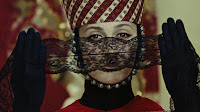Cinema of Parajanov
BIOGRAPHY
Sergei Parajanov was born in 1924 in Tbilisi, Georgia, from armenian parents. After attending Conservatory as a singer, Parajanov joined the VGIK film school in Moscow, where he studied under Igor Savchenko and Alexander Dovzhenko. His first years of directing career were in the context of the film industry of the Ukrainan SSR, and featured conformist works. It was in 1964 that Parajanov directed Shadows of Forgotten Ancestors, his first fully artistic film. His follow up film Sayat-Nova has been heavily censored by Soviet Authorities and renamed The Colour of Pomegranates. Even so, the film consolidated Parajanov's fame on a worldwide scale. In 1973, Parajanov was arrested with the charge of homosexuality, due to his activism in protesting against the purges in Ukraine from the previous years. He was released in 1977, on the pressure of the international filmmaking community. Still not allowed to direct, Parajanov resorted to collage and plastic art in this period of his life. During the distention of the '80s, Parajanov finally was able to return to directing with two films. He passed away of lung cancer in 1990, just a year after he could achieve total artistic freedom.
THE BARD-POET
Parajanov built himself an artistic persona, in which he would present himself as a form of bard, of cantor of cultures. His background allowed him to have an ethnographic insight that served as basis to most of his masterpieces, and often his films would center on the characters of poets. Parajanov's criticism towards the Soviet Authorities, frequent persecution and incarceration is compatible with this character, often at the mercy of figures of power, longing for freedom to express his artistic inclinations. Parajanov was famous for a sense of humour. It is said that during the time he was persecuted by Brezhnev's government, he claimed that the Soviet leader was afraid of him because "he was living in Parajanov's time and not Brezhnev's time".
CINE-PAINTING
Paraajnov and Tarkovsky have been bound in the history of cinema by a similar quest for a more "poetic" approach to filmmaking, that would distance itself from the social-realist impositions. While Tarkosvky's inclination was for the spiritual, the non-religious Parajanov's interest was in the aesthetic form. A self proclaimed "servant of beauty", Parajanov's films, especially starting from The Colour of Pomegranates, would feature a fading presence of narration in the traditional sense, an omnipresence of gestual motives, symbolic objects, rich decorations, actors chosen for their expressive beauty rather than for a traditional sense of performance. Parajanov has described his idea of cinema as close to the realm of paintings, in the sense that a frame would present some coerographed movement constructed for the pleasure of the composition.
IDENTITIES
Parajanov's films present a number of folklores: that of the Ukrainan Hutsul population, that of his own ethnicity, the armenians, but also the georgian tradition and, in his final film, the azeri one. One of the most relevant aspects of Parajanov's films is his skill in representing a folkloristic tradition with a deep knowledge and understanding - without falling into an attempt to a documentaristic reproduction. Particularly, his last three movies suggest an idea of the caucasian region as one, multicultural reality, in which identities that have waged war against each other are syncretically united - a concept that is still very contemporary.
FILMOGRAPHY
The First Lad (1959)
Ukrainan Rhapsody (1961)
Flower on a Stone (1962)
Shadows of Forgotten Ancestors (1965)
The Colour of Pomegranates (1968)
The Legend of Suram Fortress (1985)
Achik Kerib (1988)











Comments
Post a Comment